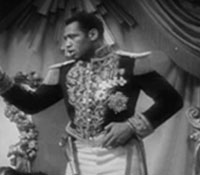There is no more typical black character in early twentieth-century American film than the handyman Joe in Show Boat. The supporting role of the obsequious, inarticulate servant seems ill suited to its brilliant, classically trained performer, Paul Robeson. Robeson’s performance of Othello holds the record for the longest-running play by Shakespeare on Broadway; his concerts and recordings of protest songs and Negro spirituals helped popularize this music in the United States and abroad. Rutgers University valedictorian and graduate of Columbia Law School, Robeson was an outspoken public intellectual and humanitarian.
But in Hollywood in the 1930s and in the decades that followed, the number and types of roles available to black actors in commercial films were limited at best.
There is no more typical black character in early twentieth-century American film than the handyman Joe in Show Boat. The supporting role of the obsequious, inarticulate servant seems ill suited to its brilliant, classically trained performer, Paul Robeson. Robeson’s performance of Othello holds the record for the longest-running play by Shakespeare on Broadway; his concerts and recordings of protest songs and Negro spirituals helped popularize this music in the United States and abroad. Rutgers University valedictorian and graduate of Columbia Law School, Robeson was an outspoken public intellectual and humanitarian.
But in Hollywood in the 1930s and in the decades that followed, the number and types of roles available to black actors in commercial films were limited at best.
Joe is both the film’s icon of southern black subservience and its beacon of hope. It is he, in this dramatic, soulful rendition of “Ol’ Man River,” who sets up Show Boat’s principal message: that the human will and spirit can overcome almost any hardship. Yet the character was little more than a stereotype—a shadow of the  complex being whom Robeson sought to reveal, not in the words he was given, but through the nuances of his extraordinary performance.
complex being whom Robeson sought to reveal, not in the words he was given, but through the nuances of his extraordinary performance.
Depicting African Americans neither as slaves nor as equal, such ambiguous, subtly hostile images typified black representation in mainstream visual culture at the dawn of the civil rights movement. While less aggressive than the grotesque stereotypes of the segregationist South, this imagery was no less damaging to African Americans and no less enabling of the prejudices of white people.
Image Credit/Caption (Click on thumbnail for full image)
Screen Capture, The Emperor Jones, 1933. Robeson was a commanding actor and Baritone: concerts and recordings of protest songs and Negro spirituals helped popularize them in the United States and abroad. His performance of Othello holds the record for the longest running Shakespeare play on Broadway. He appeared in eleven films. Seeking out dignified characters, Robeson achieved modest success in England. He saw no future for himself in American movies “because the South is Hollywood’s box office.” Rutgers University valedictorian and graduate of Columbia Law School, Robeson was an outspoken public intellectual and humanitarian. In the 1940s, he embarked on an international crusade against racism and segregation in the form of manifestos, speeches, and recitals.